#snow rabby
Text




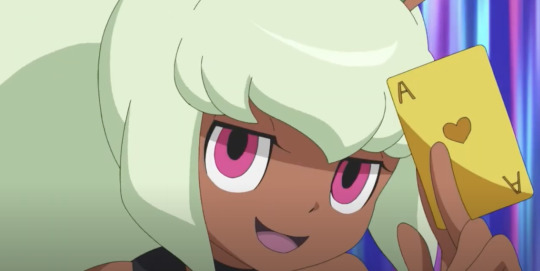



Bunnies and a fruity-looking captain thunder from music note episode 73
I was super confused at first cause the first screenshot I got is almost identical to their introduction in the YW! series so I thought I got it wrong for a moment. But it just looks like they completely recycled the animation (why am I not surprised)
#yokai watch#yo-kai watch#yo kai watch#youkai watch#yokai watch anime#agent spect hare#agent spect-hare#bunny mint#snow spect hare#snow spect-hare#snow rabby#captain thunder
19 notes
·
View notes
Text

tried my hand at a snow rabby redesign
she kinda bugs me since she's a recolor of. well. so i redesigned her lol. she has albinism now.
my version of snow rabby does snow rescue, basically helping after avalanches to find survivors. so the snow in her name means somethin' now. she has lopped ears!! which i thought of a while back bc it'd be cute and make her look different from bunny mint.
3 notes
·
View notes
Text

[ID: A pyramid of crystalline snow topped with deep orange syrup on a bright blue plate. End ID]
بقسمة / Buqsuma (Palestinian snow dessert)
بُقْسُمَة ("buqsuma"), or بوظة الشتاء ("būẓa shitā'", "winter ice cream"), is a dessert, possibly of Aramaic origin, eaten in cold and mountainous rural regions within Palestine, Syria, Jordan, Lebanon, and Turkey. It consists of freshly fallen snow topped with grape molasses (دبس العنب; "dibs al-'inab"), date molasses, pomegranate molasses, or storebought snow syrup (شراب الثلج ; "shrāb aṯ-ṯalj"). In Lebanon it may be topped with honey or orange syrup; and in Syria and Lebanon it may also be called سويق or سويقة ("sawīq" or "sawīqa").
Buqsuma is eaten for only a few days a year at the end of the snowy season in February. An old rhyme cautions against eating snow too early in the season:
أول تلجة دم
تانية تلجة سم
تالتة تلجة كل ولا تهتم
("ʔawwal tallaja damm
"tānya tallaja samm
"tālta tallaja kul wa lā tahtamm")
("The first snowfall is blood
"The second snowfall is poison
"The third snowfall, eat and don't worry")
Journalist Hussein Saqr speculates that the intention may be to allow the first snows to clear the air from summer and fall dust and other pollutants before the snow is safe to consume.
During these late winter days, eating and sharing buqsuma becomes a social ritual; guests are invited to share the dessert from a wide platter, or given individual bowls to dress to their taste with syrup, milk, and sugar. Children bring bowls of snow inside and eat buqsuma by the fire to warm up and recuperate from a day at play.
In Syria, buqsuma is prepared especially in the مُحافظة السويداء ("Muḥāfaẓat as-Suwaydā'"; Suwayda Governorate) in the south; in the طرْطوس ("Ṭarṭūs") and إدلب ("'Idlib") Governorates in the northeast; and along the جبال لبنان الشرقية ("Jibāl Lubnān ash-Sharqiyya"; Anti-Lebanon mountain range) from جبل الشيخ ("Jabal ash-Shaykh"; Mountain of the Sheikh / "Mount Hebron") to the جبال القلمون ("Jibāl al-Qalamūn"; Qalamoun Mountains) in Damascus Governorate.
In Palestine
Within Palestine, buqsuma is eaten only in الخليل ("Al-Khalīl" / "Hebron"), in the occupied West Bank. Palestinian food writer Reem Kassis points out that the regional specificity of the dish is due to the nature of the land: Al-Khalil is one of the few places in Palestine to receive snow.
Al-Khalil is also famous for its viticulture. "It is well known among Palestinians that Al-Khalil grows the best grapes," according to embroidery artist Wafa Ghnaim. Though grape vines have existed in Palestine since antiquity, Al-Khalil was one of the few locales to maintain them even during the Crusades, which caused the abandonment of olive and grape orchards elsewhere. As with oranges and pomegranates, an association between terroir, agriculture, and design reveals itself in Palestinian art: the قطف عنيب ("qiṭf 'inab"; "bunch of grapes") motif is common in Al-Khalil embroidery (تطريز; "taṭrīz"; often transliterated "tatreez").
Around 1700, Rabbi Gedalia mentions Al-Khalil's grapes as being particularly praiseworthy:
ויש בא"י הרבה פירות האילן, כגון ענבים, תאנים, ורמונים, זתים […]. והענבים הם גדולים ועגולים בירושלים. אבל בחברון תוב"ב הם מרובים וגדולים מן הענבים אשר בירושלים. וכשמוכרים את הענבים של חברון בירושלים משבחים אותם וצועקים: בואו ותקנו הענבים של חברון ! ומענב אחד מתמלא הפה ממשקה.
And there are in the land of Israel many tree fruits, such as grapes, figs, pomegranates, and olives [...]. The grapes are big and round in Jerusalem, but in Hebron they are more numerous and larger than the grapes in Jerusalem. And when vendors sell the grapes of Hebron in Jerusalem, they praise them and shout: Come and buy the grapes of Hebron! And one grape fills the mouth with nectar. (pp. 337-8)
Al-Khalil's viticulture is closely integrated with Palestinian food culture. Three distinct harvests yield different products. In the early spring, some of the leaves from the grape vines (وَرَق الدوالي; "waraq ad-dūwāli") will be harvested, when they are young, tender, and sour: good for stuffing with rice, meat, and vegetable fillings to make several popular Palestinian dishes.
Later in the spring, grape farmers harvest early, sour grapes (حصرم; "ḥiṣrim"; Levantine dialect "ḥuṣrum"). Some of these will be pressed to make عصير حصرم ("'aṣīr ḥuṣrum"; "juice of sour grapes"), a tart liquid that may be drunk plain, or used to give acidity to soups or salads. Others will be pickled in brine, or dried and ground to make a sour condiment called "سماق الحصرم" ("sumāq al-ḥuṣrum," "sour grape sumac").
The third harvest is in the late summer, when the grapes have fully ripened. Grape farmers in Al-Khalil may sell some of their summer harvests to Palestinian wineries and arak distilleries. Other ripe grapes will be pressed and their juice boiled down and dried to produce مَلبَن ("malban"), a Levantine fruit leather. And still more of this juice will be reduced into dibs al-'inab, which is then used to make buqsuma, added to tea as a sweetener, or mixed into tahina and scooped up with bread; it is especially popular during Ramadan as a quick way to boost energy.
Dibs al-'inab has been produced in Palestine for hundreds of years. Rabbi Gedalia describes grape molasses, which he calls "grape honey" ("דבש של ענבים"; "dvash shel 'anavim"):
שמבשלים את התירוש היוצא מן הענבים מיד כשסוחטין אותן, והוא אז מתוק מאוד כדבש ממש, וכ"כ מבשלים עד שנעשה עב כמו דבש.
They cook the must which is expressed from the grapes immediately after they are squeezed. It is then very sweet, like real [bee's] honey. Then they cook it again until it becomes thick as honey. (p. 338)
The recipe below is for buqsuma with Al-Khalil-style grape molasses.

[ID: An extreme close-up on snow crystals topped with syrup in bright white and various shades of orange; bubbles are trapped throughout the syrup. End ID]
Viticulture Under Occupation
Today, the tending and harvesting of grapes in Al-Khalil take place under the shadow of Israeli settlements. Israel encourages the transfer of settler populations to settlements in Al-Khalil—including particularly fervent Israeli nationalist cells in the middle of Palestinian areas—with financial incentives and the creation of infrastructure that only settlers can move through freely. Palestinians are forbidden to drive in the "H2" area of Al-Khalil, which encompasses the central Old City and the الحرم الإبراهيمي ("Al-Ḥaram al-Ibrāhīmī"; Sanctuary of Abraham), and has been under Israeli military control since 1997. Israel conducts regular raids in the nominally Palestinian "H1" area, forcing people to leave their homes, destroying property, and committing arbitrary arrests and imprisonments.
The rapid expansion of settlements in the areas around Al-Khalil, such as those in what Israel calls גּוּשׁ עֶצְיוֹן (“Gush Etzion”; Etzion Bloc) and גִּבְעַת חַרְסִינָה ("Givat Harsina"), pushes Palestinians into ever-smaller and denser areas surrounded by settlements, rendering them still more vulnerable to Israeli control.
Alessandro Petti describes the strategy by which Israel fragments and isolates Palestinian areas, while allowing flow of movement between territories for non-Palestinians, as a distinction between free-flowing settler "archipelagoes" and Palestinian "enclaves." Infrastructure such as patrols, roadblocks, barriers, curfews, strip-searches and thorough searches of luggage—to which only Palestinians are subjected—make travel a time-consuming, nerve-wracking, and uncertain process: one that may end with being denied a permit, turned back from a border, or jailed for driving on a road which turns out to be prohibited to Palestinians. Because the rules are constantly changing, Palestinians may continue to avoid a road that is no longer actively barricaded out of fear that attempting to traverse it will lead to arrest.
Official Israeli military policy and settler violence alike cast a pall on Palestinian agricultural tradition and innovation. Farming and shepherding communities in the southern hills of Al-Khalil have been subjected to harassment, home demolition, and forced displacement at the hands of settlers and military bulldozers. Settlers burn grape and olive orchards and cut down mature grape vines. Palestinians are no longer allowed to access ancestral agricultural land that has been overtaken by colonists. Israeli military orders and settler harassment emptied Al Khalil's Old Souq of its vegetable and fruit markets in 2000; in 2019, plans were made to raze Palestinian shops and build a new settlement atop them. These plans would move forward in July of 2023.
Reprisal and collective punishment in the wake of militants' October 7th attacks on settlers have been felt in the West Bank and also impact agriculture in Al-Khalil. Grapes rot on the vine with farmers forbidden to tend them. Streets have been closed, shutting Palestinian farmers into their homes, while Palestinian shepherds in villages in the Al-Khalil area have been displaced and harassed with drones. Settler attacks and destruction of crops, already on a continual uptick for the previous several years, increased to a new high in 2023.
Olives, Grapes, and Resistance
Agriculture has been an important site of Palestinian resistance to settler incursion as, despite harassment, surveillence, and violence, Palestinians insist on staying on their land and in their homes. The Palestinian minority who inhabit the H2 area of Hebron, continuing to tend their olive trees, prevent the area from becoming settler-only and keep alive the hope that Al-Khalil will not become a "ghost town."
Various projects based in Al-Khalil combat settler technologies and strategies. Farmers in Al-Khalil launched the Cooperative Society for Agricultural Marketing and Processing in 1984 to increase grape farmers' self-sufficiency, reduce produce waste, and contribute to the production of Palestinian grape delicacies. The 2022 Counter Surveillance project, launched by Palestinian activist Issa Amro and artist Adam Broomberg, meets the Israeli security cameras stationed among Al-Khalil's olive groves with its own video feed, livestreamed online and to art museums.
Palestine's annual grape festival at حلحول ("Ḥalḥūl"), just north of Al-Khalil, took place in 2023 as scheduled; farmers displayed boxes of grapes of all colors and varieties, and sold dibs, malban, raisins, and jam. And Palestinian farmers and activists contribute to resurgences of indigenous seed varieties—such as the دابوقي ("dābūqi") grape, historically particularly prominent in Al-Khalil—in an effort to preserve Palestine's biodiversity and economic self-sufficiency.
Buy seeds from the Palestinian Heirloom Seed Library
Help Palestinian families evacuate Gaza
Contribute to an eSIM donation drive
Ingredients:
For the syrup (makes 2/3 cup):
2.5kg (5.5lb) tart green grapes, stems removed
For the base:
A large bowl of fresh snow
If it doesn't snow where you live, you can try making shaved ice using a snowcone machine; putting water in an ice-cream maker until you achieve a slushy texture; or running ice cubes through a blender.
Instructions:
For the syrup:
1. Remove grapes from their stems and rinse.
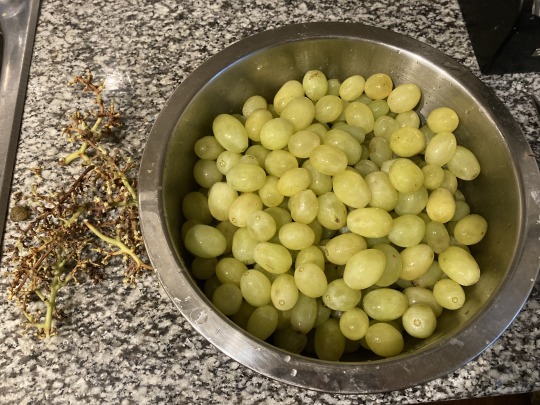
2. In a large bowl, mash and muddle grapes with your hands or a potato or bean masher; or pass grapes through a blender, food mill, or juicer.
3. Strain mashed grapes through a metal strainer, and then a cheesecloth (if you used a juicer, skip right to the cheesecloth). I had 4 cups (1 litre) of grape juice at this point.

4. Pour grape juice into a thick-bottomed pot with a large diameter, preferably one with a light-colored bottom. Heat on medium to bring to a boil.
5. Continue simmering juice, skimming scum off the surface as it arises. Occasionally wipe down the edges of the pot with a wet pastry brush to prevent sugar from sticking and burning.

6. Eventually scum will stop rising. Continue to simmer until several shades darker in color and bubbling vigorously. Syrup should still pour freely, and just barely coat the back of a spoon. I had just over 2/3 cup (160 mL) at this point.

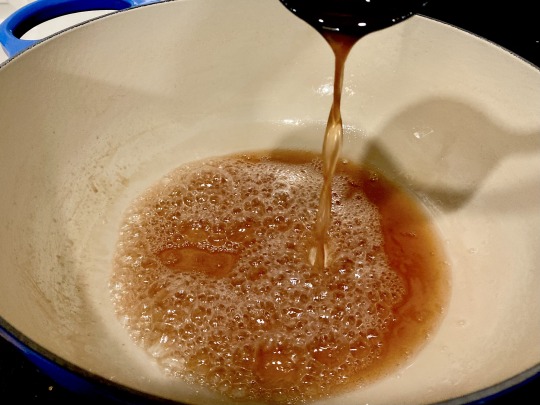
7. Remove from heat and allow to cool slightly before pouring into a jar. Allow to cool to room temperature before refrigerating. If you want to keep the syrup for multiple months or at room temperature, use a sterilized jar.
Compost the grape peels, or reserve to make fruit scrap vinegar.
For the dish:
1. Set a large bowl out several hours into a heavy snowfall; or collect just the top layer of freshly fallen snow after it has been snowing for several hours. Snow that falls earlier in a snowfall, or that has been sitting out for a longer period of time, is more likely to contain pollutants.
2. Compact the snow with a spoon to make the texture homogenous. Some people run it through a blender. Fill individual serving bowls with snow.
3. Pour cooled molasses to taste onto the snow and mix.
247 notes
·
View notes
Text
Welcome to Revenge of the Underrated!
Some of you asked me to put a "haven't watched both" to be more fair to the more unknown movies, but I've seen other tournaments doing this and I think it limits too much who can participate in the polls. So what I decided to do is a double elimination!
What does that mean? That means a movie has to lose twice to be eliminated. In other words, there will be a sorts of losers bracket that'll be part of main bracket. I'm undecided on whether to do this for only one round or the whole bracket, as it would make the tournament very long. Do let me know if you have any opinion about it.
Anyway, Revenge of the Underrated, Round 1:

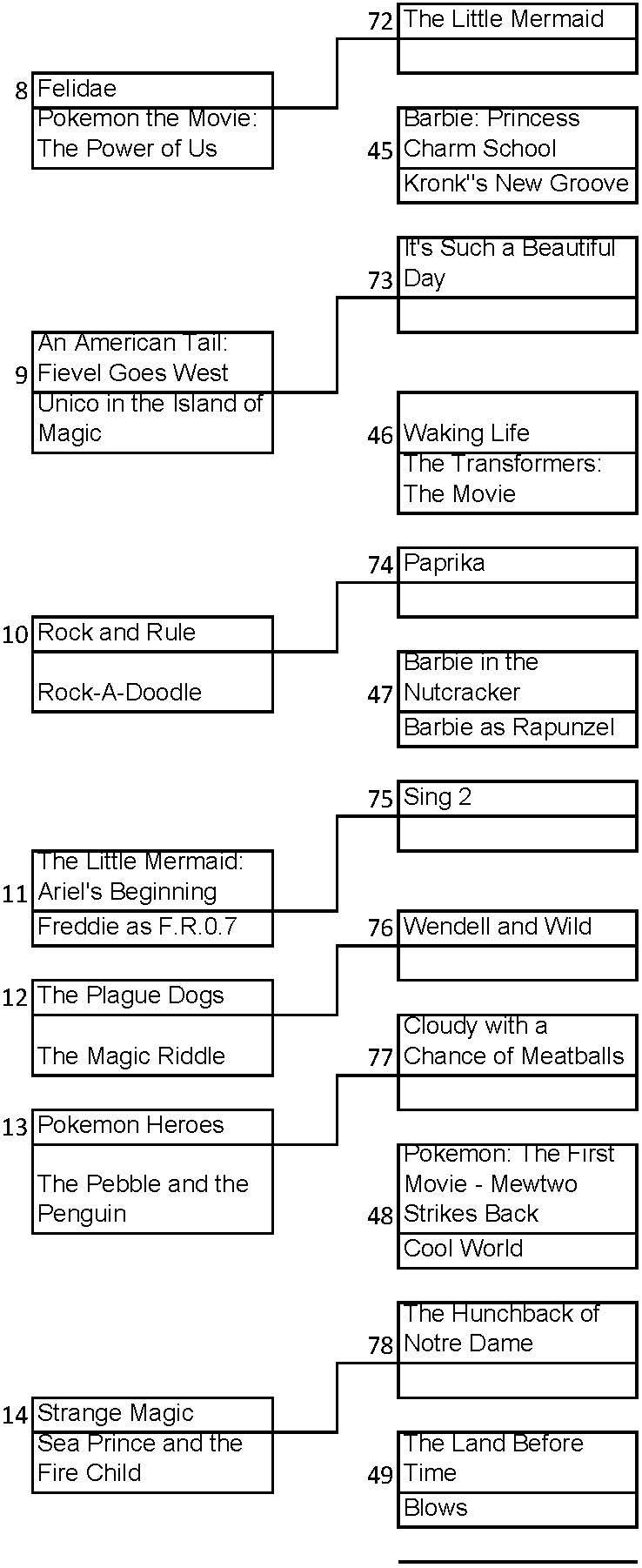


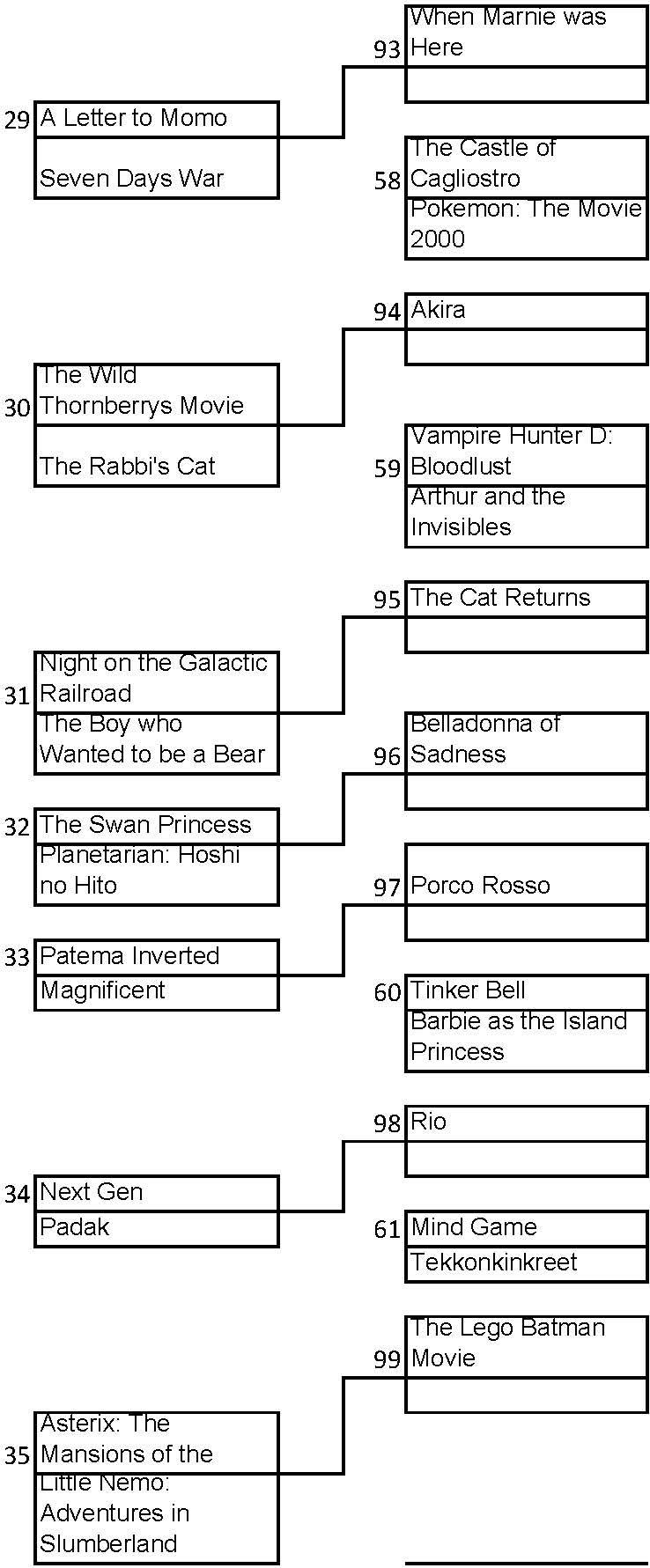

Miss Hokusai vs Happily N'Ever After
Final Fantasy VII: Advent Children vs Tiger and Bunny: The Rising
Ballerina vs Book Girl
On-Gaku: Our Sound vs Pretty Guardian Sailor Moon Eternal The Movie Part 1
Cats don't Dance vs The Flight of Dragons
Dragon Ball Z: Cooler's Revenge vs The Girl Without Hands
The Twelve Tasks of Asterix vs Flatland: The Film
Felidae vs Pokemon the Movie: The Power of Us
An American Tail: Fievel Goes West vs Unico in the Island of Magic
Rock and Rule vs Rock-A-Doodle
The Little Mermaid: Ariel's Beginning vs Freddie as F.R.0.7
The Plague Dogs vs The Magic Riddle
Pokemon Heroes vs The Pebble and the Penguin
Strange Magic vs Sea Prince and the Fire Child
Help! I'm a Fish vs Red Shoes and the Seven Dwarfs
16.Azur and Asmar: The Prince's Quest vs Rainbow Brite and the Star Stealer
17.Titan A.E. vs Ico, the Brave Horse
18.The Adventures of Mark Twain vs A Troll in Central Park
19.The Case of Hana and Alice vs Once Upon a Forest
20.Underdogs vs Long Way North
21.Mars Needs Moms vs The Twelve Months
22.Phineas and Ferb: The Movie: Candace Against the Universe vs Blinky Bill
23.Robot Carnival vs Revue Starlight: The Movie
24.One Piece: Baron Omatsuri and the Secret Island vs Winx Club: The Secret of the Lost Kingdom
25.Ruben Brandt, Collector vs Samurai Jack: The Premiere Movie
26.Lupin III: The First vs Pippi Longstocking
27.The Three Caballeros vs The Legend of Manxmouse
28.Princes and Princesses vs The Snow Queen
29.A Letter to Momo vs Seven Days War
30.The Wild Thornberrys Movie vs The Rabbi's Cat
31.Night on the Galactic Railroad vs The Boy who Wanted to be a Bear
32.The Swan Princess vs Planetarian: Hoshi no Hito
33.Patema Inverted vs Bartok the Magnificent
34.Next Gen vs Padak
35.Asterix: The Mansions of the Gods vs Little Nemo: Adventures in Slumberland
36.Thumbelina vs Catnapped!
37.Early Man vs Rainbow Magic: Return to Rainspell Island
38.Junk Head vs Hey Arnold! The Jungle Movie
39.Charlotte's Web (1973) vs The Princess and the Goblin
40.Shaun the Sheep Movie vs Jimmy Neutron: Boy Genius
41. Redline vs Balto
42. The Addams Family vs Inu-Oh
43. Epic vs Mary and the Witch's Flower
44.The Girl Who Leapt Through Time vs Vivo
45.Barbie: Princess Charm School vs Kronk''s New Groove
46.Waking Life vs The Transformers: The Movie
47.Barbie in the Nutcracker vs Barbie as Rapunzel
48.Pokemon: The First Movie - Mewtwo Strikes Back vs Cool World
49.The Land Before Time vs When the Wind Blows
50.The Secret of NIMH vs Summer Wars
51.The Black Cauldron vs All Dogs go to Heaven
52.The Red Turtle vs FernGully: The Last Rainforest
53.Sinbad: Legend of the Seven Seas vs Ron's Gone Wrong
54.The Boxtrolls vs Jin-Roh: The Wolf Brigade
55.Arthur Christmas vs One Piece Film Red
56.Barbie of Swan Lake vs The Rescuers Down Under
57.Legend of the Guardians: The Owls of Ga'Hoole vs Secret of the Wings
58.The Castle of Cagliostro vs Pokemon: The Movie 2000
59.Vampire Hunter D: Bloodlust vs Arthur and the Invisibles
60.Tinker Bell vs Barbie as the Island Princess
61.Mind Game vs Tekkonkinkreet
62.The Many Adventures of Winnie the Pooh vs Dragon Ball Super: Broly
63.Mirai vs Dragon Ball Super: Super Hero
64.The Lion King II: Simba's Pride vs Scooby-Doo! and the Cyber Chase
23 notes
·
View notes
Text
Excerpt from an interview with Ted Kaczynski (aka Unabomber) in which he recounts his day to day life in the forest:
BVD (the interviewer): What was an average day like for you in Lincoln?
TJK (Ted Kaczynski): That’s a very difficult question to answer because I don’t know that there was an average day. My activities varied so much according to the season and according to the tasks I had before me on a given day. But I will describe a representative day…
TJK: …Well, let’s take a day in January, and let’s suppose I wake up about 3:00 a.m. to find that snow is falling. I start a fire in my stove and put a pot of water on. When the water comes to a boil I dump a certain quantity of rolled oats into it and stir them for a few minutes until they are cooked. Then I take the pot off the stove, add a couple of spoonfuls of sugar and some milk—made from powdered milk.
While the oats are cooling I eat a piece of cold boiled rabbit meat.
Afterward I eat the oats. I sit for a few minutes before the open door of the stove watching the fire burn down, then I take my clothes off again, get back into bed, and go to sleep. When I wake up, the sky is just starting to get light. I get out of bed and dress myself quickly because it’s cold in the cabin. By the time I’m dressed there’s a little more light and I can see that it’s no longer snowing and the sky is clear. Because of the fresh snow it should be a good day for rabbit hunting. So I take my old, beat-up, single-shot 22 down from the hooks on the wall. I put my little wooden cartridge-box, containing 16 cartridges, in my pocket, with a couple of books of matches wrapped in plastic bags and a sheath knife on my belt in case I have to build a fire in an emergency. Then I put on my snowshoes and take off. First there’s a hard climb to get up on top of the ridge, and then a level walk of a mile or so to get to the open forest of lodgepole pines where I want to hunt. A little way into the pines I find the tracks of a snowshoe hare. I follow the trail around and around through its tangled meanderings for about an hour. Then suddenly I see the black eye and the black-tipped ears of an otherwise white snowshoe hare. It’s usually the eye and the black-tipped ears you notice first. The bunny is watching me from behind the tangled branches and green needles of a recently-fallen pine tree. The rabbis is about 40 feet away, but it’s alert and watching me, so I won’t try to get closer. However, I have to maneuver for an angle to shoot from, so that I can have a clear shot through the tangle of branches—even a slender twig can deflect a .22 bullet enough to cause a miss. To get that clear shot I have to lie down in the snow in an odd position and use my knee as a rest for the rifle barrel. I line up the sights on the rabbit’s head, at a point just behind the eye…hold steady…ping! The rabbit is clipped through the head.
Such a shot ordinarily kills the rabbit instantly, but the animal’s hind legs usually kick violently for a few seconds so that it bounces around in the snow. When the rabbit stops kicking I walk up to it and see that it’s quite dead. I say aloud “Thank you, Grandfather Rabbit”– Grandfather Rabbit is a kind of demigod I’ve invented who is the tutelary spirit of all the snowshoe rabbits. I stand for a few minutes looking around at the pure-white snow and the sunlight filtering through the pine trees. I take in the silence and the solitude. It’s good to be here. Occasionally I’ve found snowmobile tracks along the crest of the main ridge, but in these woods where I am now, once the big-game hunting season is over, in all my years in this country I’ve never seen a human footprint other than my own. I take one of the noosed cords out of my pocket. For convenience in carrying I put the noose around the rabbit’s neck and wrap the other end of the cord around my mittened hand. Then I go looking for the trail of another rabbit.
When I have three rabbits I head home. On arriving there I’ve been out some six or seven hours. My first task is to peel off the skins of the rabbits and remove their guts. Their livers, hearts, kidneys, brains, and some assorted scraps I put in a tin can. I hang the carcasses up under the shelter, then run down to my root cellar to fetch some potatoes and a couple of parsnips. When these have been washed and other chores performed—splitting some wood maybe, or collecting snow to melt for drinking water—I put the pot on the boil, and at the appropriate time add some dried wild greens, the parsnips, the potatoes, and the livers and other internal organs of the rabbits. By the time it’s all cooked, the sky is getting dark. I eat my stew by the light of my kerosene lamp. Or, if I want to economize, maybe I open the door of the stove and eat by the light of the fire. I finish off with a half a handful of raisins. I’m tired but at peace. I sit for a while in front of the open door of the stove gazing at the fire. I may read a little. More likely I’ll just lie on my bed for a time watching the firelight flicker on the walls. When I get sleepy I take off my clothes, get under the blankets, and go to sleep.
BVD: I envy you, too … While work, that does sound wonderful.
Freedom and autonomy. No time clock to punch, whether literal or figurative. But let me shift topic. You just mentioned sleep. Was your bed, or bunk, comfortable?
TJK: Well, it was comfortable enough for me.
#unabomber#nature#diy#preparation#alternative#handcrafted#resources#forest#anarchism#night in the woods#woods
42 notes
·
View notes
Note
for the fake fic ask game:
a THG fic with: accidental marriage, political intrigue and mutual pining!
OOF this is so hard i’ve been thinking about this one for a WHILE but i think i got it!! in honor of Passover…a Jewish!Everlark (shtetl!District 12, really) AU set during Catching Fire.
The twin burns on their hands aren’t the only things binding Katniss and Peeta together that fateful night before the Passover Seder. When they tear the loaf to drop in the Mellark fireplace together, cleansing the house of chametz before the holiday, they’re transported to another time with another burnt loaf…until they look down to find a toasted piece of bread in each of their hands. And, worse yet, Mrs. Mellark saw the whole thing. Couldn’t they at least have waited to do the toasting under a chuppah? Oy, what a shanda!
As Katniss and Peeta are marched down to the Justice Building by Mrs. Mellark and the town rabbi, Katniss fears the repercussions from President Snow, whose perfect, goyische Capitol wedding was just ruined by the accidental fulfillment of the District 12 tradition.
A month after Peeta stepped on the glass in the Justice Building, making their marriage legal in the eyes of both the state and HaShem, they learn the consequences of their actions when President Snow announces the Quell. With nothing left to lose, Katniss and Peeta start to think that maybe the meshugas they caused could be what saves them in the arena. After all, being star-crossed lovers worked pretty well last time.
In the battle for their culture, their rights, their traditions, and their lives, they can’t help but wonder…is it beshert?
glossary for the goyim:
shtetl - small Jewish towns in Eastern Europe (generally pre WWII for obvious reasons)
Passover - holiday where we don’t eat leavened bread and we often burn it to ensure our houses are entirely bread-free before the holiday
Seder - super long ritual dinner we do on the first night or two of passover
chametz - leavened bread
chuppah - a big ritual tarp we get married under
shanda - scandal
rabbi - Jewish spiritual leader (comparable to a minister or imam)
goyische - goy-like (“goy” means non-Jew; serves a similar role to gringo/a in Spanish-speaking regions)
breaking the glass - wedding tradition where the groom steps on a piece of glass which usually ends the ceremony
HaShem - literally translates to “the name” but is just God (we’re not allowed to say God’s name)
meshugas - ridiculousness, chaos
beshert - basically destiny (“it would’ve happened anyway…”)
#the hunger games#thg#katniss everdeen#peeta mellark#everlark#judaism#jewish#jewish!peeta#jewish!katniss#passover#chag sameach#fake fic ask game#ask game#asks#asks answered#jewish!everlark#retiredficwriter
9 notes
·
View notes
Text


The English poet William Wordsworth was born on April 7th 1770.
While he may be remembered as a quintessential English bard he did have his good points and holidayed in Scotland. His sister Dorothy wrote Recollections of a Tour Made in Scotland, A. D. 1803 about their six-week, 663-mile journey through the Scottish Highlands. Some have called it "undoubtedly her masterpiece" and one of the best Scottish travel literature accounts during a period in the late 18th and early 19th centuries which saw hundreds of such examples. It is often compared as the Romantic counterpart to the better-known Enlightenment-era travel memoirs of Samuel Johnson with his friend James Boswell.
Anyway back to the birthday boy! Here is a poem he wrote while touring our country.....
Memorials Of A Tour In Scotland.
Too frail to keep the lofty vow
That must have followed when his brow
Was wreathed--'The Vision' tells us how--
With holly spray,
He faltered, drifted to and fro,
And passed away.
Well might such thoughts, dear Sister, throng
Our minds when, lingering all too long,
Over the grave of Burns we hung
In social grief--
Indulged as if it were a wrong
To seek relief.
But, leaving each unquiet theme
Where gentlest judgments may misdeem,
And prompt to welcome every gleam
Of good and fair,
Let us beside this limpid Stream
Breathe hopeful air.
Enough of sorrow, wreck, and blight;
Think rather of those moments bright
When to the consciousness of right
His course was true,
When Wisdom prospered in his sight
And virtue grew.
Yes, freely let our hearts expand,
Freely as in youth's season bland,
When side by side, his Book in hand,
We wont to stray,
Our pleasure varying at command
Of each sweet Lay.
How oft inspired must he have trod
These pathways, yon far-stretching road!
There lurks his home; in that Abode,
With mirth elate,
Or in his nobly-pensive mood,
The Rustic sate.
Proud thoughts that Image overawes,
Before it humbly let us pause,
And ask of Nature, from what cause
And by what rules
She trained her Burns to win applause
That shames the Schools.
Through busiest street and loneliest glen
Are felt the flashes of his pen;
He rules 'mid winter snows, and when
Bees fill their hives;
Deep in the general heart of men
His power survives.
What need of fields in some far clime
Where Heroes, Sages, Bards sublime,
And all that fetched the flowing rhyme
From genuine springs,
Shall dwell together till old Time
Folds up his wings?
Sweet Mercy! to the gates of Heaven
This Minstrel lead, his sins forgiven;
The rueful conflict, the heart riven
With vain endeavour,
And memory of Earth's bitter leaven,
Effaced for ever.
But why to Him confine the prayer,
When kindred thoughts and yearnings bear
On the frail heart the purest share
With all that live?--
The best of what we do and are,
Just God, forgive!
Pics are the man himself and a quote he made about the Scottish Bard, Rabbie Burns.
9 notes
·
View notes
Text
Was thinking about how I initially integrated Condy's flagship into Slurquest under the auspice of anti-semitism -- it acquires Jewish associations 1. when Dirk describes it as "a big red space ark" (Noah's Ark) and 2. via its function as womb symbol of sorts, intersecting with the return-to-the-womb undercurrents of putting-the-bunny-back-in-the-box by way of the other meaning of ark, "box" (the Ark of the Covenant). And I sometimes worry that the comic is doing the classic rabbit > rabbi pun, such that putting the bunny in the box intersects with, say, Spades Slick commanding everyone to get in the oven on Holocaust Remembrance Day. I could go on, but that's the main bits.
Anyway it clicked while I was shoveling snow today that the trident, the letter psi Ψ, the visual basis of Condy's flagship, is also yet another fucking bow-and-arrow, providing yet another point of contact between Native American and Jewish perjoration, either taking "archery" as its own image or as a derivative of "ark". Annoyed that this bifurcation wasn't apparent sooner but glad to have it now!
8 notes
·
View notes
Text
The R - Part 1:
What is the connection between Mr Remora and Duchess R [of Winnipeg]?
One of the many mysteries that Lemony Snicket has left behind for readers (and viewers, to a certain extent) is 'What does the R stand for, in "Duchess R" ?' I am going to attempt to answer this question using any resources available, under the title 'The R'. This will be over a series of unfortunate posts, in this format.
Firstly, we must look for any and all clues that can give us even the slightest hint as to what R might stand for.
For this, I have gone through every character in ASOUE and this is produced: (after the cut, but feel free to skip ahead)
Lemony Snicket
Violet Baudelaire
Klaus Baudelaire
Sunny Baudelaire
Count Olaf
Bald Man with the Long Nose
Mrs. Bass
Beatrice Baudelaire
Beatrice Baudelaire II
Bertrand Baudelaire
Bruce
Colette
Fernald
Hal
Henchperson of Indeterminate Gender
Hugo
Incredibly Deadly Viper
Geraldine Julienne
Kevin
Kind Editor
Man with a Beard but No Hair
Vice Principal Nero
Phil
Arthur Poe
Duncan Quagmire
Isadora Quagmire
Quigley Quagmire
Mr. Remora
Carmelita Spats
Kit Snicket
Esmé Squalor
Jerome Squalor
Justice Strauss
White-Faced Women
Woman with Hair but No Beard
Albert Poe
Edgar Poe
Polly Poe
Wart-Faced Man
Alaskan Cow Lizard
Androgynous Cobra
Madame diLustro
Dissonant Toad
Green Gimlet Toad
Inky Newt
Irascible Python
O. Lucafont
Mamba du Mal
Monty Montgomery
Monty Montgomery's Sister
Gustav Sebald
Stephano
Virginian Wolfsnake
Ike Anwhistle
Josephine Anwhistle
Bertrand Baudelaire's Cousin
Gina-Sue
Larry Your-Waiter
Captain Sham
Charles
Foreman Firstein
Flacutono
Georgina Orwell
Shirley
Sir
Elwyn
Coach Genghis
Ms. Tench
Ben
Gunther
Chief of Police
Council of Elders
Detective Dupin
Hector
Mr. Lesko
Officer Luciana
Mrs. Morrow
Verhoogen Family
V.F.D. Crows
Babs
Bearded Man
Laura V. Bleediotie
Lou
Mattathias
Milt
Mr. Sirin
Volunteers Fighting Disease
Beverly and Elliot
Olivia Caliban
Chabo the Wolf Baby
Man With Pimples On His Chin
Ringmaster
Volunteer Feline Detectives
Infant Servant
C.M. Kornbluth
Snow Gnats
Snow Scouts
V.F.D. Eagles
White-Faced Women's Sibling
Winnipeg Scout
Gregor Anwhistle
Fiona
The Great Unknown
Captain Widdershins
Mrs. Widdershins
Count Olaf's father
Count Olaf's mother
Dewey Denouement
Ernest Denouement
Frank Denouement
Alonso
Ariel
Jonah Bellamy
Sadie Bellamy
Rabbi Bligh
Brewster
Byam
Friday Caliban
Miranda Caliban
Calypso
Erewhon
Ferdinand
Finn
Professor Fletcher
Gonzalo
Ishmael
Dr. Kurtz
Larsen
Ms. Marlow
Monday
Madame Nordoff
Omeros
Mr. Pitcairn
Robinson
Sherman
Thursday
Weyden
Willa
Beekeeper
Building Committee
Emily Dickinson
Dolores
Esmé Squalor Fan Club
Gerta
Daniel Handler
Haruki
Ivan Lachrymose
Eleanora Poe
Lena Pukalie
Duchess R
R's Mother
R's Father
Young Rölf
Sally Sebald
Shoemaker
A. Snicket
B. Snicket
Chas. Snicket
D. Snicket
E. Snicket
F. Snicket
G
H
I
Jacob Snicket
M
N
O
Mr. Spats
Mrs. Spats
Town Fathers
Valorous Farms Dairy
Baron van de Wetering
Yeah. Every single one.
Now, let's rule out everyone who does not have a name beginning with R, or is unclear: (again, feel free to skip ahead)
Bald Man with the Long Nose
Mrs. Bass
Henchperson of Indeterminate Gender
Incredibly Deadly Viper
Kind Editor
Man with a Beard but No Hair
Mr. Remora
White-Faced Women
Woman with Hair but No Beard
Wart-Faced Man
Madame diLustro
Monty Montgomery's Sister
Bertrand Baudelaire's Cousin
Foreman Firstein
Coach Genghis
Ms. Tench
Verhoogen Family
Mr. Sirin
Man With Pimples On His Chin
Infant Servant
White-Faced Women's Sibling
Winnipeg Scout
The Great Unknown
Captain Widdershins
Mrs. Widdershins
Count Olaf's father
Count Olaf's mother
Rabbi Bligh
Dr. Kurtz
Ms. Marlow
Madame Nordoff
Mr. Pitcairn
Robinson
Beekeeper
Duchess R
R's Mother
R's Father
Young Rölf
Mr. Spats
Mrs. Spats
Town Fathers
As the title states, we'll keep some focus on Remora, but we'll eliminate all other minor characters:
Bald Man with the Long Nose
Henchperson of Indeterminate Gender
Incredibly Deadly Viper
Kind Editor
Man with a Beard but No Hair
Mr. Remora
White-Faced Women
Woman with Hair but No Beard
Wart-Faced Man
Madame diLustro
Monty Montgomery's Sister
Bertrand Baudelaire's Cousin
Robinson
Duchess R
R's Mother
R's Father
Young Rölf
According to Various Fan Deductions:
TMWABBNH & TWWHBNB are Gifford & Ghede
The White-Faced Women are Zada and Zora
Lemony's Kind Editor is Moxie Mallahan
Madame diLustro is Sunny Baudelaire
This rules out the 4 of them.
Bald Man with the Long Nose
Henchperson of Indeterminate Gender
Incredibly Deadly Viper
Mr. Remora
Wart-Faced Man
Monty Montgomery's Sister
Bertrand Baudelaire's Cousin
Robinson
Duchess R
R's Mother
R's Father
Young Rölf
Logically speaking, why would there be a connection between Ink and Duchess R? Let's eliminate unlikely possibilities:
Mr. Remora
Monty Montgomery's Sister
Bertrand Baudelaire's Cousin
Robinson
Duchess R
R's Mother
R's Father
Young Rölf
Monty Montgomery's sister would be (_insert name here_) Montgomery. This, to me, rules her out too... and the same logic applies to Bertrand's cousin.
Mr. Remora
Robinson
(Duchess R)
(R's Mother)
(R's Father)
Young Rölf
Obviously her family are related:
Mr. Remora
Robinson - Islander
Young Rölf
So, the above names are generated. I will, henceforth, analyse a link between each character and R, starting with Remora.
POINTS:
a. It's known that a few characters in the Snicket-verse have alliterating names, such as Quigley Quagmire, Beatrice Baudelaire.
b. It's also known that some characters have WEIRD connections to others, such as Quigley's 'relation' to Mr Poe.
THEORY: Given a. and b. to be true, Mr R _______ Remora, has some abstract connection to the Duchess.
This connection can only really be established if one goes by Netflix canon and assumes Nero's surname to be Feint, and combines this with ATWQ:
Duchess R is Remora's boss' ancestor's murderer's friend.
R's friend is Lemony, who murdered Hangfire, who is the ancestor of Nero, Remora's boss.
Part 2 Still to Come...
¬ Th3r3534rch1ngr4ph, Unfortunate Theorist/Snicketologist
#asoue#vfd#lemony snicket#a series of unfortunate events#snicketverse#asoue netflix#theory#duchess of winnipeg#duchess r#hangfire#vice principal nero#nero feint#mr remora#part 1
8 notes
·
View notes
Photo




Snow Rabby from episode 211
The episode gimmick was white yokai making everything white (which is kinda problematic when you say it like that XD) hence the final pic
#yokai watch#yo-kai watch#youkai watch#yo kai watch#yokai watch anime#snow rabby#snow spect-hare#snow spect hare
10 notes
·
View notes
Text
Before Americans were so stupid as to idiotically place Thanksgiving far too close to Christmas, the ancient Israelites were pioneering 'holiday ramming' by placing Sukkot far too close to Yom Kippur and the High Holidays.
No I don't want to go celebrate in a grass tent, rabbi, I need a good three weeks to recover from the two-hour Yom Kippur service on a 26 hour fast. Also at 154 BPM the chazzan recited more than enough Torah to last me at least month I'm good.
(If you need any particular proof that Judaism emerged from the worship of an extremely local deity, I offer you the idea of a religious festival that wants you to spend long hours (even overnight) outdoors in October. Parts of this country saw snow back in August for pity's sake. By the time the tenants of Judaism were really being codified Jews were already living in diaspora communities so why is it always seem like it's taken as given you don't live more than 200km from Jerusalem?)
14 notes
·
View notes
Note
I would love a Christmas themed Damirae. I keep trying to pitch a Christmas Carol angst with happy ending, but I think everyone is too busy. If that idea isn't a good fit maybe he brings her home from Christmas set in the DCAMU assuming Apokolips War never happened?
Hello,
I don't think I can write Christmas Carol, but I can write angst for Christmas, so...
Christmas Hanukkah...
It was dreary out, which was fitting as he trudged, determinedly through the snow and slush. Making it atop the hill, to the eerie private cemetery which remained outside of the city and on the Manor’s property he looked around briefly. Four hundred plus years of family lay to rest here. A small part of him loathed this spot, but carefully he pick his way through the snow towards the closest and newest headstones.
Hard to think it’d been ten years, it’d been a freak incident, a riot out of control. Shortly after Damian had been introduced to the Titans and everything regarding Trigon had happened, Dick and Kori had gotten engaged. Coming home to Gotham was always a risk, but because of Kate Kane; father, Dick, and Kori were killed in a riot after Kate had shot a prominent Rabbi. At the time, father, Dick, and Kori were civilians, but even they could not stand against an angry mob trying to lash out against Katherine Kane for her stupidity of shooting a Rabbi. The ensuing fall out had left three prominent members of Gotham dead, fourteen civilians trampled to death, fifty-eight civilians injured in varying degrees, and seven first responders killed; and Kate got off. The secret of the Bats were exposed, and Alfred had helped shield Damian from the brunt of media backlash.
The media was not upset at the Wayne Family being Bats, no, Waynes were Saints of Gotham, and Demons of the Night to keep Gotham safe. If anything, Gotham had elevated his family to be untouchable; and their fury at his loss, and their loss, was what had resulted in the death of Kate Kane; she’d been executed earlier yesterday.
Ironic, Damian was not a practitioner of Christmas, or Hanukkah, but her death in the middle of Hanukkah, and on Christmas Eve; as if it were the greatest gift Gotham could give him, it was a bitter flavor on his tongue. Standing at the headstones though the tears burned his eyes, as he stared at the names so elegantly engraved there.
“I’m sorry, father,” he whispered. “I do not visit as often as I should, and we are not a practicing family, but… yesterday Gotham gave me Katherine Kane’s death. I thought… I thought it would give me something, closure, or something… but I see it gives nothing. I am so sorry…” he sniffled a little, desperately whipping at his running nose as he felt the sting of the cold air. “I… I came to tell you I am engaged. You met her, but I… I do not think you would approve. Mother does not approve, but I do not care what mother has to say. Kyle has been more of a mother for me than Mother has been, and Kyle approves. I meant to tell you, Kyle has remained, she retired being Catwoman and remained, she assisted Alfred. Alfred is surprisingly fond of her, though wary.
“I am going to marry Raven, Raven Roth, and… we have no family, father, but I wanted… I wanted to share this with you. I wish you and Grayson were here,” he said softly. “I will visit more often, father.”
“Damian?” he turned at the voice and saw his fiancée standing there in the winter’s snow, her black hair was like a cloak around her white appearance. It was almost ethereal how she looked. She walked forward and looked at the grave markers before her hand slid into his.
“I… I did not desire to burden you, beloved,” he whispered.
“I have decided to be your partner, Damian, I do not mind burdens,” she said softly. “Hello Bruce, hello Dick, Kori,” she said softly to the headstones.
“Why did you come out here?”
“Alfred would’ve come, but he is… the winter’s too cold, Damian, and he’s ninety years old,” she said softly. “Also, I thought I should come, say hello and Merry Christmas.”
“You do not celebrate Christmas?”
“I’m a Christmas tree Jew, Damian, I like Christmas, and you celebrate it, for Dick,” she smiled. “Also, I got you this, and I thought you’re like to open it here, with your family,” she explained as she produced a slim box. Damian’s fingers trembled a little as he accepted it. Carefully pulling apart the wrapping paper he was stunned when he found himself looking at a sleek black box. He quirked his brow as he slid off the lid and then he stopped, his breath hitching as he glanced at Raven, then at the headstones.
“Alfred said it was your fathers, and it was destroyed that day, but you had kept it, and I thought… if you don’t like it, I can return it to the original state,” she started. Damian swooped over her, his mouth crashing on hers as he caught the back of her head, pulling her in close. The box was pressed tightly between them and he shivered as she kissed him back rather shy and uncertain. He pulled back, his brow resting on hers as he smiled weakly.
“Thank you…” he whispered. “This… how’d you fix it?”
“Witch,” she reminded him with a smile. “And a bit of demon, I can fix anything. Just takes a bit of magic.”
“I forget,” he mused.
“Good,” she winked and he smiled as he looked down at the watch she had restored. It was a Rolex, nothing too fancy though but rather nice, simple, it’d been his father’s favorite watch, and it’d been crushed that day. Damian had tried over the years to get it fixed, but it was impossible.
“I love you, Damian Wayne,” she whispered.
His brow came to rest against hers, and he smiled a bit. He loved this demon, she made everything alright, and he was pleased to have her with him as he picked up his father’s mantal again. She made the hell Gotham had been a heaven, and he needed her.
“I love you, Raven Roth,” he rasped. “Thank you, father, I wanted to tell you… I found the love of my life, and I hope you do not mind that she is a demon.”
“He doesn’t mind,” she whispered softly. “And he says he loves you.”
He hugged her tight and close.
#bluboothalassophile#dc fanfic#demonbirds#damirae#damian wayne x raven#damian al ghul#damian wayne#raven roth#raven
26 notes
·
View notes
Text

Commentary on the Holy Gospel of Jesus Christ according to St. Mark – Chapter 9
St. Mark, the disciple and interpreter of St. Peter (as noted by St. Jerome.) according to what he heard from St. Peter himself, wrote at Rome a brief Gospel at the request of the Brethren (fellow Christians), about ten years after our Lord's Ascension; which when St. Peter had heard, he approved of it, and with his authority he published it to the Church to be read. Baronius and others maintain, that the original was written in Latin: but the more general opinion is that the Evangelist wrote it in Greek.
First, Christ is transfigured in the presence of Elias and Moses; hence He predicts that Elias shall return as precursor when He comes to judge. Second (v. 16), He heals a man possessed by a deaf and dumb spirit. Third (v. 32), He settles the dispute among the disciples about the primacy by His devotion to humility, teaching that we should become like little children. Fourth (v. 37), He does not allow the disciples to forbid a man who was casting out demons in His name, although he was not his follower. Fifth (v. 41), He declares what a great evil scandal is, and teaches (v. 48) that it must be removed by the fire of mortification and the salt of discretion.
And after six days Jesus taketh with him Peter and James and John, and leadeth them up into an high mountain apart by themselves, and was transfigured before them.
2 And his garments became shining and exceeding white as snow, so as no fuller upon earth can make white.
3 And there appeared to them Elias with Moses; and they were talking with Jesus.
4 And Peter answering, said to Jesus: Rabbi, it is good for us to be here: and let us make three tabernacles, one for thee, and one for Moses, and one for Elias.
5 For he knew not what he said: for they were struck with fear.
6 And there was a cloud overshadowing them: and a voice came out of the cloud, saying: This is my most beloved son; hear ye him.
7 And immediately looking about, they saw no man any more, but Jesus only with them.
8 And as they came down from the mountain, he charged them not to tell any man what things they had seen, till the Son of man shall be risen again from the dead.
9 And they kept the word to themselves; questioning together what that should mean, when he shall be risen from the dead.
10 And they asked him, saying: Why then do the Pharisees and scribes say that Elias must come first?
11 Who answering, said to them: Elias, when he shall come first, shall restore all things; and as it is written of the Son of man, that he must suffer many things and be despised.
12 But I say to you, that Elias also is come, (and they have done to him whatsoever they would,) as it is written of him.
13 And coming to his disciples, he saw a great multitude about them, and the scribes disputing with them.
14 And presently all the people seeing Jesus, were astonished and struck with fear; and running to him, they saluted him.
15 And he asked them: What do you question about among you?
16 And one of the multitude, answering, said: Master, I have brought my son to thee, having a dumb spirit.
17 Who, wheresoever he taketh him, dasheth him, and he foameth, and gnasheth with the teeth, and pineth away; and I spoke to thy disciples to cast him out, and they could not.
18 Who answering them, said: O incredulous generation, how long shall I be with you? How long shall I suffer you? Bring him unto me.
19 And they brought him. And when he had seen him, immediately the spirit troubled him; and being thrown down upon the ground, he rolled about foaming.
20 And he asked his father: How long time is it since this hath happened unto him? But he said: From his infancy:
21 And oftentimes hath he cast him into the fire and into waters to destroy him. But if thou canst do any thing, help us, having compassion on us.
22 And Jesus saith to him: If thou canst believe, all things are possible to him that believeth.
23 And immediately the father of the boy crying out, with tears said: I do believe, Lord: help my unbelief.
24 And when Jesus saw the multitude running together, he threatened the unclean spirit, saying to him: Deaf and dumb spirit, I command thee, go out of him; and enter not any more into him.
25 And crying out, and greatly tearing him, he went out of him, and he became as dead, so that many said: He is dead.
26 But Jesus taking him by the hand, lifted him up; and he arose.
27 And when he was come into the house, his disciples secretly asked him: Why could not we cast him out?
28 And he said to them: This kind can go out by nothing, but by prayer and fasting.
29 And departing from thence, they passed through Galilee, and he would not that any man should know it.
30 And he taught his disciples, and said to them: The Son of man shall be betrayed into the hands of men, and they shall kill him; and after that he is killed, he shall rise again the third day.
31 But they understood not the word, and they were afraid to ask him.
32 And they came to Capharnaum. And when they were in the house, he asked them: What did you treat of in the way?
33 But they held their peace, for in the way they had disputed among themselves, which of them should be the greatest.
34 And sitting down, he called the twelve, and saith to them: If any man desire to be first, he shall be the last of all, and the minister of all.
35 And taking a child, he set him in the midst of them. Whom when he had embraced, he saith to them:
36 Whosoever shall receive one such child as this in my name, receiveth me. And whosoever shall receive me, receiveth not me, but him that sent me.
37 John answered him, saying: Master, we saw one casting out devils in thy name, who followeth not us, and we forbade him.
38 But Jesus said: Do not forbid him. For there is no man that doth a miracle in my name, and can soon speak ill of me.
39 For he that is not against you, is for you.
40 For whosoever shall give you to drink a cup of water in my name, because you belong to Christ: amen I say to you, he shall not lose his reward.
41 And whosoever shall scandalize one of these little ones that believe in me; it were better for him that a millstone were hanged around his neck, and he were cast into the sea.
42 And if thy hand scandalize thee, cut it off: it is better for thee to enter into life, maimed, than having two hands to go into hell, into unquenchable fire:
43 Where there worm dieth not, and the fire is not extinguished.
44 And if thy foot scandalize thee, cut it off. It is better for thee to enter lame into life everlasting, than having two feet, to be cast into the hell of unquenchable fire:
45 Where their worm dieth not, and the fire is not extinguished.
46 And if thy eye scandalize thee, pluck it out. It is better for thee with one eye to enter into the kingdom of God, than having two eyes to be cast into the hell of fire:
47 Where their worm dieth not, and the fire is not extinguished.
48 For everyone shall be salted with fire: and every victim shall be salted with salt.
49 Salt is good. But if the salt became unsavory; wherewith will you season it? Have salt in you, and have peace among you.
Commentary: Saint Mark - Chapter 9
Verse 11. And be despised. In Greek ἐξουδενηθῇ, i.e., to be emptied out, to be accounted as nothing. Understand, thus shall it happen to Elias, that when by his great labors he has restored the faith which has collapsed, in return for such great benefits he shall receive curses and ill-treatment from the ungrateful and the impious, and shall at last be killed by them (Apocalypse 11:7-8).
Verse 13. scribes disputing, in Greek συζητοῦτας, i.e., quarrelling, having an altercation with them, that is, with the disciples of Jesus, as to whether He is the prophet and Messias and whether His teaching is true.
Verse 14. And presently all the people seeing Jesus, were astonished and struck with fear. Because they saw Jesus so unexpectedly present after His absence, and at so opportune a time to protect and defend His disciples against the scribes. Again, it was because they saw in the face of Jesus, who had a little while before been transfigured, some remaining rays of His splendor; just as in the countenance of Moses, after his converse with God, there were rays, and, as it were, horns of light (Exodus 34:29). And running to him, they saluted him. Thus Franz Lucas.
Verse 15. What do you question about among you? In Greek συζητεῖτε, i.e., dispute, debate.
Verse 19. Troubled him (Greek ἐσπάραξεν, i.e., “bruised, lacerated, tore apart”), that is, convulsed and twisted his whole body. Hence it is added in explanation, and being thrown down upon the ground, he rolled about foaming. Because, in fact, the demon was experiencing the power of Christ, and foresaw that he would speedily be cast out. Therefore, with indignation and gnashing of teeth he thus grievously afflicted and tormented the energumen [possessed man].
Verse 29. They passed through Galilee, and he would not that any man should know it. Lest He should be detained by the Galileans who loved Him and His benefits. For He was hastening to Jerusalem to His cross and death, about which He was speaking privately to His disciples, that He might accomplish the will of His Father, and redeem the human race by His death. Thus Maldonatus, Franz Lucas, and others.
Verse 31. But they understood not the word. That is to say, in what manner and for what cause Christ was to die; and how these words concerning His near approaching death agreed with what He had often told them, that His kingdom was at hand. For it is clear otherwise that the Apostles understood and believed that Christ would die (see Matth. 17:23), when they are said to have been sorry at this saying and prediction of Christ concerning His death. Unless you prefer to say that they were ignorant of the death of Christ, because they were in hesitation with respect to it on account of the different sayings of Christ, apparently inconsistent with one another, and that accordingly they inclined to the easier view which was the more pleasing to them, namely that Christ would not die. For it was this which they preferred and wished to be true. “For so lovers frame dreams for themselves.” So they endeavored to persuade themselves that these words of Christ concerning His death had some other hidden meaning, and that they were to be taken mystically, and not according to their literal sense.
Verse 37. John answered him, saying, Master, we saw one casting out devils in thy name, who followeth not us, and we forbade him. It is as though he said, “Have we done well or ill?” John asks this question not out of envy, as Calvin would have it, but out of love and zeal for the honor of Christ. And it was occasioned by what He had said in verse 36, Whosoever shall receive one such child as this in my name receiveth me. Meaning: If he who receives a little one in Thy name receiveth Thy Father and Thyself, what should we think concerning someone who works signs, i.e., miracles in Thy name, and yet followeth not us, that is, is not Thy attendant and disciple, as we are? “Because,” says Cyril (in Catena Lucae 9 vers. 49), “the Savior had given power to His Apostles to cast out unclean spirits, they thought that it had been conceded to no one else but themselves to enjoy such dignity.” So Theophylact, Victor, and Titus on Luke 9.
Note here that those who thus cast out devils in the name of Christ, and yet did not follow Him, were believers, but imperfect ones, forasmuch as they shrank from the rugged poverty and the renunciation of their goods, such as was the lot of the Apostles and were not inclined to follow Christ in His evangelical labors, persecutions, and crosses. Still they had some faith in Christ, by virtue of which they cast out devils. So S. Ambrose, commenting on Luke 9:49. And as they did so, Christ wrought and cooperated with them, that His power and glory might be made more manifest, which wrought such great things by means of those who were so imperfect, and, as it were, aliens. So Theophylact.
Note, secondly, that the Apostles did not forbid such people through hatred, but out of zeal for Christ, as though they were detracting from the glory of Christ and His ordinance, according to chapter 3, verse 15 (where Christ gives to His Apostles only the power of casting out devils). But this zeal of theirs was indiscreet, especially because they had rashly forbidden them, without consulting Christ. And Christ showed them that this was so for a double reason. The first is what He brings forward in the next verse. In a similar manner, when Josue saw Eldad and Medad prophesying, he wished to forbid them, as if they were detracting from the glory of Moses, in that they had not received the spirit of prophecy from Moses. But Moses checked him by saying, Why hast thou emulation for me? O that all the people might prophecy, and that the Lord would give them his spirit! (Numbers 11:29). This is the spirit of Christ, the spirit of charity and of the Holy Ghost, which makes large the heart, and envieth none, but rejoices in all good things, by whomsoever and in whatever way they are wrought (cf. 1 Cor. 13).
Verse 38. But Jesus said, Do not forbid him. For there is no man that doth a miracle in my name, and can soon (Greek ταχὺ, that is, ῥᾳδίως, i.e., easily) speak ill of me. Meaning: “Do not hinder him in a good work, and one that honors Me; because even if he does not follow Me, yet he is doing the same thing which you do, that is, he is celebrating My name, and he is making it known to men by casting out devils. Hence he does not impede My name, but rather propagates and glorifies it.”
Verse 39. For he that is not against you is for you. Meaning: “This man, therefore, is not your adversary, since he does the same that you do. He stands on your side. He helps you; he does not oppose you.” (See commentary on Matthew 12:30.)
Verse 40. For whosoever shall give you to drink a cup of water in my name, because you belong to Christ (as His disciples, followers, and Apostles): Amen I say to you, he shall not lose his reward. This is Christ’s further reason showing why the man must not be forbidden to cast out devils. It is as though Christ said, “If he who gives you a drink of water in My name, and for My sake, does well, and shall receive a reward from God, so likewise shall he who drives out devils in My name. For both the one and the other do a good work, and
benefit their neighbors in regard and respect of Me. But the latter benefit is as much greater as the demon that he expels is more harmful than the thirst which the other alleviates by a drink of water.” So Theophylact, Jansen, and others.
Verse 41. And whosoever shall scandalize one of these little ones that believe in me: it were better for him that a millstone were hanged about his neck, and he were cast into the sea. This is antithetical to verse 36. For Christ returns, after the question interposed by John about the man expelling demons in Christ’s name, to what He was saying before His discourse was interrupted: Whosoever shall receive one such child as this in my name receiveth me, etc. As if to say: “Just as he who receives, cherishes and fosters the little ones who believe in Me, receives Myself, and, therefore, shall be rewarded by Me with eternal glory in heaven; so too, on the other hand, whoever shall scandalize one of these little ones [i.e., cause one of them to offend], offendeth Me, and, therefore, shall be condemned by Me to gehenna;” that is why it would be better for him to be drowned in the sea than to scandalize a little one, because it is better to be swallowed up by the sea than by gehenna.
Verse 42. And if thy hand scandalize thee, cut it off. For a scandal is so pernicious that it harms not only the doer but the sufferer of it.
Hence, if thou sufferest a scandal from thy hand, cut it off. Meaning: If any one, relative or friend, as useful and as dear to thee as thy hand, thy foot, thine eye, scandalize thee and draw thee into sin, cut him off from thee and from thy company, lest he drag thee with him into gehenna. (See commentary on Matthew 18:6 ff.)
Verse 43. Where their worm dieth not and the fire is not extinguished. He quotes Isaias 66:24, where I have explained these words. For the damned in hell are tortured by horrid worms and eternal fires. That is why Christ repeats this saying three times [according to some manuscripts], that He may impress these worms and these fires upon us, that through horror of them we may avoid every scandal and sin.
Verse 48. For everyone shall be salted with fire: and every victim shall be salted with salt. First, Franz Lucas and Maldonatus understand “the fire of hell,” so that Christ might give the reason for what He had just said, Where their worm dieth not and the fire is not extinguished. The reason is, for everyone, namely, such as are consigned to gehenna, shall be salted with fire, that is, shall be burnt and tormented with fire, but in such manner that by the same fire, as it were by salt, they shall be preserved incorrupt for everlasting
torments. For fire shall be like salt to them, as if they were rubbed all over with salt, so as to remain perpetually incorrupt in the tormenting flames. For salt possesses the properties both of burning and
preserving. It burns and torments by burning; by its saltiness it preserves from corruption. The fire of hell does the same thing, which is the reason why it is appropriately compared to salt.
And every victim shall be salted with salt. And, that is, “just as.” As though He said, “As every victim of God is wont to be seasoned with salt, according to the law (Levit. 2:13), so whosoever shall be consigned to gehenna shall be a victim, as it were, of God’s justice and vengeance forever, and so shall be salted with unquenchable fire as with salt, that is, shall be burnt and tormented, and shall at the same time remain unconsumed in the fire.” So Isaias 34:6 teaches that the wicked shall in their torments be victims of God’s vengeance (see also Ezech. 39:17 and Jerem. 46:10). For the wicked are, as it were, victims sacrificed to the honor and glory of God’s justice. This sense is very plain, apposite, and in keeping with the context.
Second, others refer these words more remotely to what Christ said in verse 42 and following about avoiding scandals, and that to do so a hand, a foot, or an eye must be cut off. As if He had said, “Cut off from thee the person who is as dear and as necessary to thee as a hand, a foot, or an eye, if he scandalize thee; for everyone who wishes to please God, and to offer himself to Him as a spiritual victim, must cut off from him, as by the fire of mortification, the man who causes him to offend, however dear he may be. He must, therefore, be salted by undergoing tribulation, that is, he must be tormented and purified. As God’s victim he must be salted, that is, preserved with the mystical salt of prudence, discretion, and evangelical wisdom (which teaches us that it is better to cut off our hand than to go into hell).” This alludes to, or, indeed, quotes in a mystical sense, Leviticus 2:13, Whatsoever sacrifice thou offerest, thou shalt season it with salt. (See commentary.) So Theophylact on this passage from Mark, and also Theodoret, Procopius, Bede, Radulphus, Ruperti, on Leviticus 2, and Cyril (lib. 15 de Adoratione). Hence the discourse goes on, Salt is good. Hear the Gloss: “To be salted with fire is for the love of Christ to deny ourselves of those who are nearest to us, and as dear as a hand or an eye.” Hear also Bede, “The heart of the elect is the “altar,” the “victims” are good works, the “salt” is wisdom.” Christ opposes the fire of mortification to the fire of hell, and the salt to the undying worm. As though He said, “That ye may escape the fire and the worm of hell, which concupiscence generates, be zealous for the fire of mortification and the salt of wisdom. For this shall take away the rottenness of concupiscence, from which are generated the undying worms which shall be burned in the fire of hell.”
Third, by fire Bede understands charity and the Holy Spirit, and His grace and the gift of discretion, by which He guides us into all good. “If, indeed, that which is salted with salt,” he says, “keeps off the putrefying worm, then that which is salted with fire, that is, seasoned again with flames, on which salt is sprinkled, not only casts off worms, but also consumes the flesh itself. . . . Therefore, the body is to be preserved with continence, and the mind with the seasoning of wisdom. For salt means the sweetness of wisdom, and fire — the grace of the Holy Spirit.”
Lastly, the Scholiast in S. Jerome by salt understands also the fire of purgatory. Hear what he says, “The victim of the Lord is the human race, which is seasoned with the season of wisdom in this life, while the corruption of the blood, which is the source of putridity, that is, the mother of worms, is consumed, and after this life is tried by purgatorial fire.”
Verse 49. Salt is good. Salt is useful. As if to say: “O ye Apostles, who have been chosen by Me to be the salt of the earth (Matth. 5:13), you are beneficial to the world, that with your wisdom and evangelical doctrine you might season all nations.” Hear the Scholiast in S. Jerome, “It is a good thing to hear the Word of God; to season the heart with the salt of wisdom; indeed, to be salt with the Apostles, that is, to minister wisdom unto others.” Also Theophylact, “Salt preserves flesh; so the speech of a learned man prevents the
unquenchable fire from being generated in carnal men.”
But if the salt become unsavory (the Greek contains an elegant play on words, ἅλας ἄναλον, i.e., saltless salt), wherewith (i.e., with what other salt) will you season it? As though He said, “If ye, O ye Apostles, who are the salt of the earth, lose this virtue of saltiness, and become unsavory and insipid, that through love or fear of men, through cupidity or ambition, ye fall away from My doctrine and an evangelical life, who shall restore you to your former wisdom, vigor, and sanctity?” Christ plays upon the word “salt.” For salt in
Leviticus 2:13 is to be understood literally, but here it is to be taken mystically for wisdom, and metonymically for the Apostles, who had in themselves this mystic salt. Hear the Scholiast in S. Jerome, “Salt is savorless which loves the chief place, and which dares not either to rebuke or confess, loving the praise of men more than the praise of God.” Also Theophylact: “The salt is unsavory if it has no power to dry and preserve.” Christ refers to Judas, who being corrupted by the love of money, and becoming unsavory, both lost his apostleship, and did not hesitate to betray the Lord, says the Gloss.
[Therefore] Have salt in you, (namely the salt of wisdom and a Christian life, for example, humility, charity, contempt of the world, but especially peace, as Christ adds, saying:) And have peace among yourselves... “Do not ambitiously contend among yourselves for the primacy, as ye have contended” at verse 33, to which Christ refers. For such a contention will be a scandal to the whole world; and for that reason Christ added words about avoiding scandal in verses 36 and 41. But if ye preserve peace and mutual concord, ye shall be for the edification of the whole world; and being united one with another in the bond of charity, ye will be invincible, and will draw all men to yourselves and Christ. Therefore, by peace the Interlinear understands “love.” For love is the magnet of love. And the Scholiast in S. Jerome thus explains Have salt in yourselves: “The love of one’s neighbor tempers the salt of correction; and the salt of justice preserves love.”
And have peace among you. That is, let him who speaks eloquently greatly fear lest by his eloquence unity be broken. For, as Bede says, “to have salt without peace is not a gift of virtue, but a proof of condemnation; for the wiser any one is, the greater his sin if he fall.” For there are many, says the Gloss, “that while greater knowledge lifts them up, it separates them from the society of others; and the wiser they are, the more they unlearn the virtue of concord.” S. Gregory, too, says (lib. 1 epist. 24), “By salt is meant wisdom. He,
therefore, who strives to speak with wisdom should be greatly afraid, lest by his eloquence the unity of his hearers be thrown into confusion.”
Lastly, the Gloss thus expounds, Have salt in you, to mean “have discretion.” And have peace among yourselves, then means “By wisdom and discretion peace among men is both acquired and preserved. For the prudent and discreet man does nothing which may offend others and disturb peace. He disregards and bears with the infirmities of others, while those who are impatient grow angry with them and quarrel and fight with them. For the prudent man loves nothing in this world except God, and hence he views other things with “apathy,” in the sense of “without passion.”
Listen to Climacus (gradu 30). “Even the firmament has the stars for its ornament, but the tranquillity of the soul has its virtues. For I consider ἀπάθειαν, or peace of soul, to be nothing other than the heaven of the soul in the heart, which at first has all the mischievous arts of the demons as its sport and plaything.” He then adds that this peace of soul is “the palace of the most high king, and as it were a certain mortal immortality of the body.”
For more stories, please visit our website:
2 notes
·
View notes
Text
Revenge of the Underrated, Round 2!
Round 1
The big players will start competing this round, so make sure to support your favorite unknown movie with propaganda and reblogs!
Also, this round we somehow ended up with more polls than round 1, so that will be fun 😅





Luca vs Ballerina
2. Mary and Max vs Tiger and Bunny: The Rising
3. The Bad Guys vs Miss Hokusai
4. Loving Vincent vs Pretty Guardian Sailor Moon Eternal The Movie Part 1
5. Pocahontas vs The Girl Without Hands
6. Hercules vs The Twelve Tasks of Asterix
7. Anomalisa vs Cats don't Dance
8. The Little Mermaid vs Felidae
9. It's Such a Beautiful Day vs An American Tail: Fievel Goes West
10. Paprika vs Pokemon Heroes
11. Sing 2 vs The Little Mermaid: Ariel's Beginning
12. Wendell and Wild vs The Plague Dogs
13. Cloudy with a Chance of Meatballs vs Ice Age
14. The Hunchback of Notre Dame vs Strange Magic
15. Azur and Asmar: The Prince's Quest vs Red Shoes and the Seven Dwarfs
16. Mad God vs Rock and Rule
17. Batman: Mask of the Phantasm vs Titan A.E.
18. The Wind Rises vs The Adventures of Mark Twain
19. Sleeping Beauty vs Tarzan
20. Zootopia vs Robots
21. Monsters vs Aliens vs The Twelve Months
22. Robin Hood vs Phineas and Ferb: The Movie: Candace Against the Universe
23. The Case of Hana and Alice vs Revue Starlight: The Movie
24. Long Way North vs One Piece: Baron Omatsuri and the Secret Island
25. Marcel the Shell with Shoes On vs Samurai Jack: The Premiere Movie
26. My Life as a Zucchini vs Lupin III: The First
27. The Fox and the Hound vs Minions: The Rise of Gru
28. The Three Caballeros vs Princes and Princesses
29. When Marnie was Here vs A Letter to Momo
30. Akira vs The Wild Thornberrys Movie
31. The Cat Returns vs The Boy who Wanted to be a Bear
32. Belladonna of Sadness vs The Swan Princess
33. Porco Rosso vs Patema Inverted
34. Rio vs Next Gen
35. The Lego Batman Movie vs Asterix: The Mansions of the Gods
36. The Aristocats vs Thumbelina
37. James and the Giant Peach vs Rainbow Magic: Return to Rainspell Island
38. Castle in the Sky vs Hey Arnold! The Jungle Movie
39. Over the Hedge vs Charlotte's Web (1973)
40. Jimmy Neutron: Boy Genius vs The Princess and the Goblin
41. Redline vs Catnapped!
42. The Addams Family vs Little Nemo: Adventures in Slumberland
43. Epic vs Padak
44. Vivo vs Bartok the Magnificent
45. Barbie: Princess Charm School vs Night on the Galactic Railroad
46. Waking Life vs The Rabbi's Cat
47. Barbie as Rapunzel vs Seven Days War
48. Cool World vs Pippi Longstocking
49. When the Wind Blows vs Ruben Brandt, Collector
50. Summer Wars vs Winx Club: The Secret of the Lost Kingdom
51. The Black Cauldron vs Mars Needs Moms
52. The Red Turtle vs Underdogs
53. Ron's Gone Wrong vs Once Upon a Forest
54. Jin-Roh: The Wolf Brigade vs Rainbow Brite and the Star Stealer
55. Arthur Christmas vs Help! I'm a Fish
56. Barbie of Swan Lake vs Sea Prince and the Fire Child
57. Legend of the Guardians: The Owls of Ga'Hoole vs Freddie as F.R.0.7
58. Pokemon: The Movie 2000 vs Rock-A-Doodle
59. Arthur and the Invisibles vs Unico in the Island of Magic
60. Barbie as the Island Princess vs Flatland: The Film
61. Mind Game vs Dragon Ball Z: Cooler's Revenge
62. Dragon Ball Super: Broly vs The Flight of Dragons
63. Dragon Ball Super: Super Hero vs Final Fantasy VII: Advent Children
64. Scooby-Doo! and the Cyber Chase vs Happily N'Ever After
65. On-Gaku: Our Sound vs Book Girl
66. Rock-A-Doodle vs Pokemon the Movie: The Power of Us
67. The Pebble and the Penguin vs The Magic Riddle
68. A Troll in Central Park vs Ico, the Brave Horse
69. Robot Carnival vs Blinky Bill
70. The Snow Queen vs The Legend of Manxmouse
71. Early Man vs Planetarian: Hoshi no Hito
72. Nocturna vs Junk Head
11 notes
·
View notes

